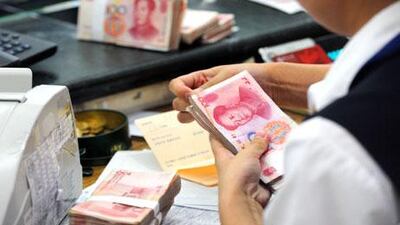Not long after the US Federal Reserve Board announced its second round of quantitative easing (QE2), the People's Bank of China (PBC), China's central bank, announced two increases of 0.5 percentage points in the required reserve ratio (RRR) of bank deposits. The RRR now stands at 18.5 per cent, a historic high.
While the Fed is planning to pump more money into the US economy, the PBC is trying to reduce the amount of money in circulation in China. Money used by commercial banks to satisfy the RRR, which is held in accounts at the PBC, can no longer be extended as loans. As a result, more money than ever is now frozen or inactive in China.
It is understandable that the Fed wants to boost demand as long as the US economy remains depressed. But why has the PBC tightened monetary policy so much? The Chinese economy is not overheating. Growth is still high, at about 10 per cent per year, but has started to moderate. And, while inflation is a concern - having risen to 4.4 per cent year on year in October, from 3.6 per cent in September - this cannot explain why the PBC raised the RRR three times earlier this year, when inflation was lower.
Instead, the PBC's policy is pre-emptive: sterilise over-liquidity and get the money supply under control to prevent inflation or overheating. At the beginning of the year, the RRR increases could be regarded as part of efforts to correct the oversupply of money that arose from the anti-crisis stimulus package. But the most recent RRR increases serve mainly to sterilise the "passive money supply" caused by the increase in foreign exchange reserves.
In September alone, China's foreign currency reserves increased by almost US$100 billion (Dh367.3bn) compared with August. With the global economy recovering, China's trade surplus began to grow. Moreover, capital inflows increased significantly because of real investment opportunities in the high-growth economy and the expectation of yuan revaluation.
But rapid growth in foreign exchange reserves means an increase in the domestic money supply, because the PBC issues 6.64 yuan (fractionally less than $1, and down 3 per cent since June) for every dollar it receives. That means money supply increased by nearly 700bn yuan (Dh385.43bn) in September. The two 50-basis-point RRR increases just locked up the same amount of liquidity.
A country with current account and capital account surpluses and increasing foreign exchange reserves normally experiences excessive money supply and high inflation. But while excessive money supply is a reality for China - the PBC now holds more than $2.6 trillion in foreign reserves - inflation has been quite moderate so far, thanks to the sterilisation policy.
The RRR is only one example of a textbook sterilisation instrument. Another is to sell off government bonds held by the central bank to take money out of circulation - again, just the opposite of what the Fed is now doing. Because China's government does not owe much debt to the public, the PBC sold out its holdings of government bonds in 2005. So it had to create something else to sell.
It created so-called "central bank bills", which commercial banks are supposed to buy voluntarily. When they do, the money they pay is also locked up in the PBC's accounts. To date, up to 5 per cent to 6 per cent of total liquidity has been returned to the central bank in this way.
Furthermore, the PBC uses unconventional instruments from time to time, such as credit ceilings or credit quotas imposed on commercial banks. This may result in extra reserves, which commercial banks cannot use to extend their credit lines. Credit quotas imposed early this year have left Chinese commercial banks with 2 per cent to 3 per cent of extra reserves.
Adding up the impact of the PBC's sterilisation efforts, about one quarter of China's total monetary base is illiquid. Thus, although China's total money supply seems excessive, with the M2-to-GDP ratio now at about 190 per cent, the real monetary base is actually much smaller than it appears. As a result, China's inflation, as well as asset prices, remain under control.
Fan Gang is professor of economics at Beijing University and the Chinese Academy of Social Sciences, director of China's National Economic Research Institute, secretary general of the China Reform Foundation and a former member of the monetary policy committee of the People's Bank of China
* Project Syndicate

